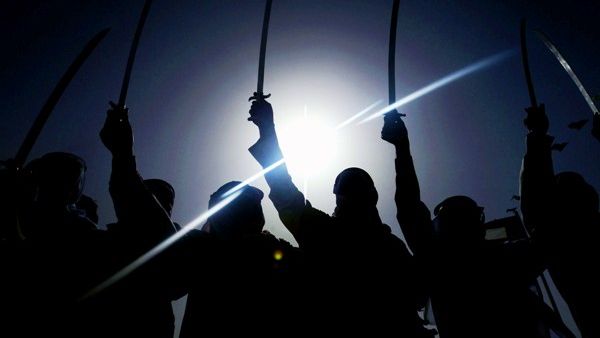Seven men convicted of armed robbery were executed in Saudi Arabia on Wednesday, despite last-minute appeals by rights groups that their lives be spared, the interior ministry and a witness said.
The condemned men were convicted of "forming a gang that carried out several armed robberies and thefts with the help of other people," the ministry said in a statement published by the official SPA news agency.
The statement was not available on the SPA website.
They were executed "as a punishment to them and to deter others" from carrying out similar crimes, SPA said , adding that their fellow robbers had been sentenced to various jail terms and lashes.
Due to conflicting media accounts, al-Akhbar could not ascertain whether the men were executed by firing squad or beheaded. Some human rights organizations said at least one of the men was condemned to be executed, then have his body crucified.
A witness told AFP by telephone that the execution was "implemented a while ago at a public square in Abha," adding that the defendants were "shot dead" and not beheaded as is customary in the kingdom.
The announcement came soon after Amnesty International released a statement renewing calls on the Saudi authorities to halt the executions.
They "look set to be shot on Wednesday morning," said Amnesty, which described the executions as "sheer brutality."
The seven men – Sarhan al-Mashaikh, Saeed al-Zahrani, Ali al-Shahri, Nasser al-Qahtani, Saeed al-Shahrani, Abdulaziz al-Amri and Ali al-Qahtani – were charged with organizing a criminal group, armed robbery and raiding and breaking into jewelry stores in 2005, and sentenced to death in 2009.
Nasser al-Qahtani told AP he was tortured to confess and had no access to lawyers.
International rights groups had protested that the men – who, depending on the source, are now aged between 20 and 24 or 27 and 31 years old – were condemned for crimes committed when they were juveniles.
"It is a bloody day when a government executes seven people on the grounds of 'confessions' obtained under torture, submitted at a trial where they had no legal representation or recourse to appeal," said Amnesty's MENA director Philip Luther.
They claimed their relatives were also "threatened with torture if they withdrew their 'confessions'," said Amnesty.
They had been scheduled to die on March 5, but their executions were postponed for a week.
Three UN human rights experts on Tuesday had also urged Saudi Arabia to halt the executions, saying the case had breached international standards of justice. In a joint statement, the United Nations monitors said the men had allegedly been convicted on the basis of trumped-up charges and flawed trials.
“In countries that have not abolished the death penalty, capital punishment may be imposed only following a trial that complied with fair trial and due process safeguards,” Christof Heyns, special rapporteur on extrajudicial, summary or arbitrary executions, said. “Any death sentence undertaken in contravention of a government’s international obligations is tantamount to an arbitrary execution.”
The Washington-based Institute of Gulf Affairs, which campaigned for the suspension of the executions of the seven men, recently said in a note to the United Nations High Commissioner for Human Rights that one of the reasons the seven were sentenced to death was that "they hail from the south, a region that is heavily marginalized by the Saudi monarchy, which views them as lower class citizens."
Executions in Saudi Arabia, which applies a strict interpretation of Islamic sharia law, are generally carried out by beheading, but media reports said authorities were considering using firing squads due to a shortage of executioners.
Also on Wednesday, authorities executed another national, Fada al-Subaie in the southwestern Mecca region, after he was convicted of murdering a fellow Saudi, SPA reported. It did not specify the method of his execution.
Wednesday's executions bring to 26 the number of people put to death in Saudi Arabia so far this year.
In 2012, the kingdom executed 76 people, according to an AFP tally based on official figures. The US-based Human Rights Watch put the number at 69.
Saudi's authorities have frequently been criticized by rights groups for the rate of executions and for perceived lack of fair trials of those condemned.
Rape, murder, apostasy, armed robbery and drug trafficking are all punishable by death under Saudi Arabia's strict version of sharia, or Islamic law.








